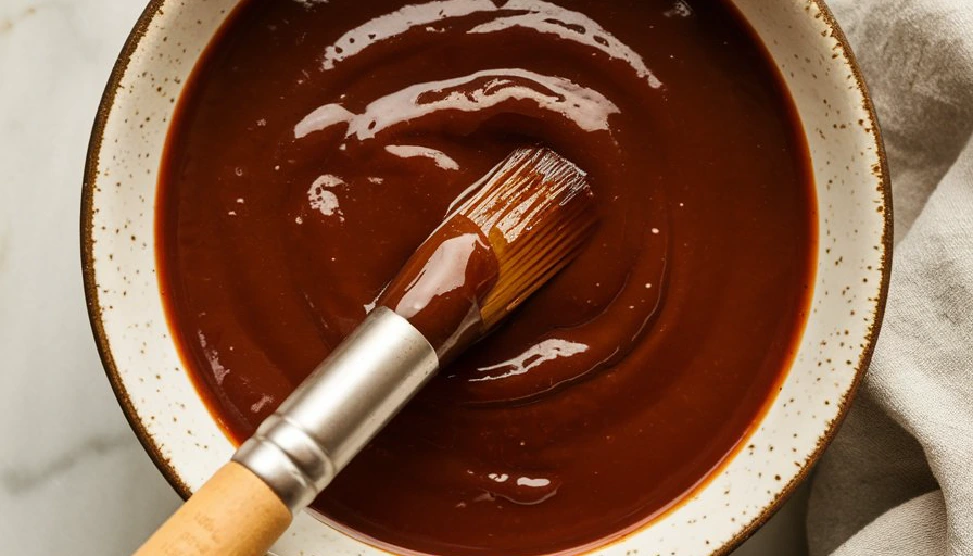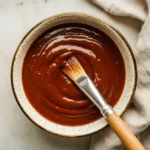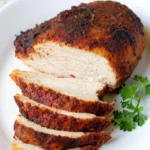Are you tired of store bought BBQ sauce recipe that never quite hits the spot? Making homemade BBQ sauce is not just a cooking skill. It can help you improve your grilling and impress friends and family at your next cookout. As a BBQ fan who has tried many recipes, I am excited to share how to make the perfect BBQ sauce at home.
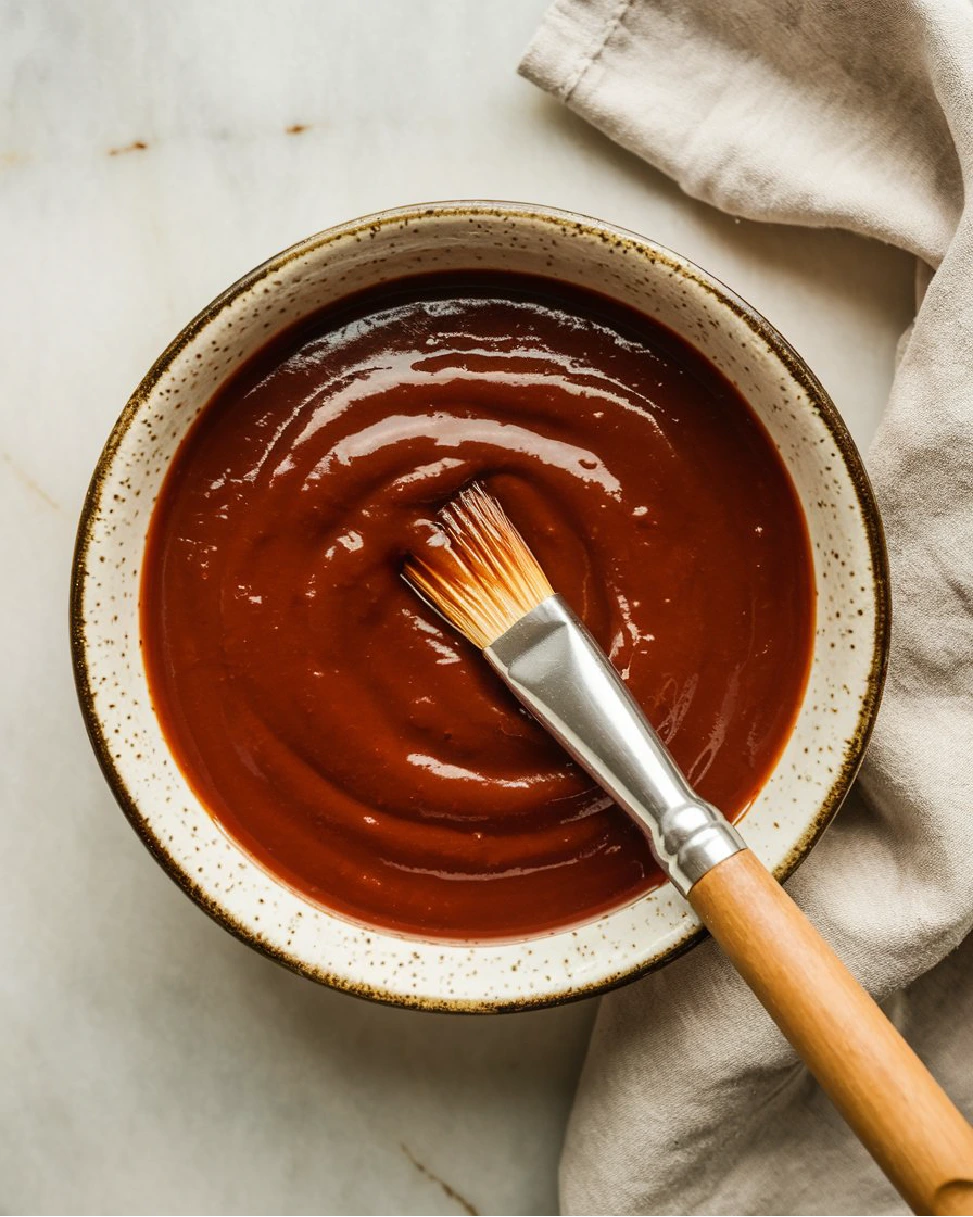
Whether you’re grilling up classic ribs, juicy chicken, or tasty BBQ meatballs, homemade BBQ sauce takes your cookout to the next level
What is BBQ Sauce?
BBQ sauce is more than just a condiment it’s a culinary tradition with deep roots in American cooking history. BBQ sauce has a history that goes back to the 17th century. It grew with barbecue cooking as settlers and enslaved people found ways to improve and preserve meat.
The beauty of homemade BBQ sauce lies in its incredible flexibility. At its core, most BBQ sauces contain some combination of:
- A tangy component (vinegar, citrus juice)
- A sweet element (sugar, molasses, honey)
- A tomato base (ketchup, tomato paste, fresh tomatoes)
- Spices and seasonings (paprika, black pepper, garlic)
BBQ sauce is fascinating because it varies greatly by region in the United States. Each style shows local tastes, ingredients, and barbecue traditions.
Types of BBQ Sauce
The United States has developed distinct regional BBQ sauce styles, each with passionate devotees. Understanding these variations will help you craft a homemade BBQ sauce recipe that matches your preferred flavor profile:
Kansas City-Style BBQ Sauce
Kansas City sauce is what most people think of when they imagine classic BBQ sauce. Thick, rich, and features:
- Tomato base (usually ketchup)
- Molasses for deep sweetness
- Brown sugar
- Vinegar for tang
- Various spices including paprika and black pepper
This style serves as the foundation for many commercial BBQ sauces and is excellent on ribs, chicken, and pulled pork.
Texas-Style BBQ Sauce
Texas BBQ sauce reflects the state’s straightforward approach to barbecue:
- Thinner consistency than Kansas City style
- Less sweet with more heat
- Prominent beef stock flavors
- Cumin, chili powder, and other Southwestern spices
- Worcestershire sauce for depth
Perfect for beef brisket and other hearty cuts, Texas style BBQ sauce lets the meat’s flavor remain the star.
Carolina BBQ Sauce
Carolina sauces actually come in two main varieties:
Eastern North Carolina: The purist’s sauce primarily vinegar-based with:
- Apple cider vinegar dominance
- Red pepper flakes for heat
- Minimal or no tomato
- Black pepper and salt
Western North Carolina/South Carolina: Also known as “Lexington style,” this adds:
- Some tomato product (ketchup or tomato paste)
- Brown sugar for slight sweetness
- Similar vinegar base to Eastern style
Both Carolina BBQ sauce recipes shine when paired with pulled pork.
Memphis BBQ Sauce
Memphis style offers a balanced middle ground:
- Thinner than Kansas City sauce
- Moderately sweet (less molasses)
- Tangier with more vinegar
- Often includes mustard notes
- Paprika and other spices for depth
This versatile sauce works wonders on ribs and is often used as both a marinade and finishing sauce.
Alabama White BBQ Sauce
The outlier in BBQ sauce traditions:
- Mayonnaise base instead of tomato
- Apple cider vinegar
- Black pepper
- Horseradish for kick
- No tomato products at all
Traditionally paired with chicken, this creamy, tangy sauce offers a refreshing alternative to red sauces.
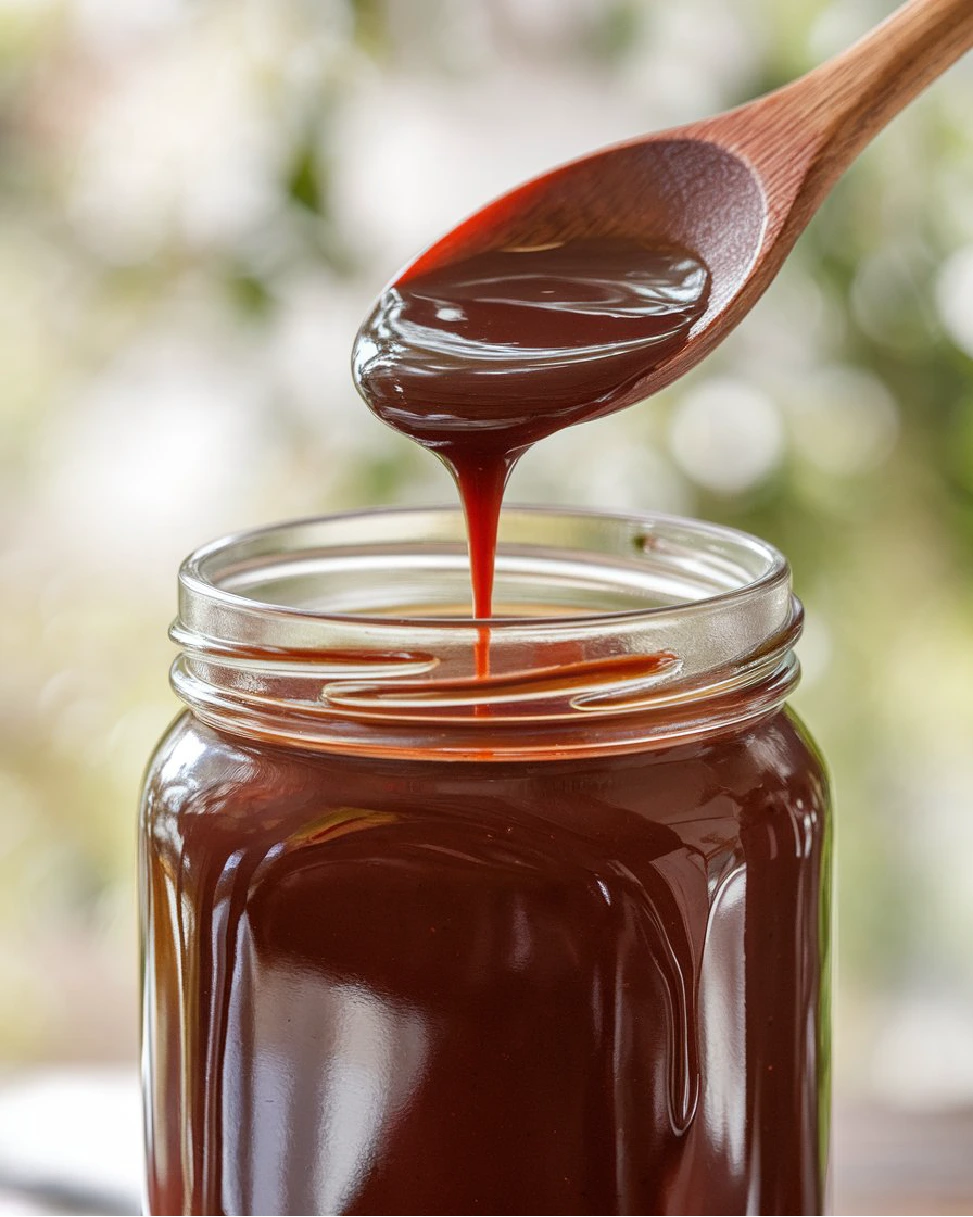
Essential Ingredients for Homemade BBQ Sauce
Creating the perfect homemade BBQ sauce recipe requires understanding how key ingredients contribute to the final flavor profile:
Vinegar (The Tangy Foundation)
Vinegar provides essential acidity that:
- Balances sweetness
- Tenderizes meat proteins
- Preserves the sauce naturally
- Adds brightness to the flavor profile
Different vinegars create different effects:
- Apple cider vinegar: Fruity notes, traditional choice
- White vinegar: Sharper, cleaner tang
- Balsamic vinegar: Sweet-sour complexity, great in premium sauces
Tomato (The Base)
Most BBQ sauces (except Alabama white and some Carolina styles) use tomato as their foundation:
- Ketchup: Pre-seasoned, consistent base with built-in sweetness
- Tomato paste: Concentrated flavor, needs additional ingredients to balance
- Fresh tomatoes: More work but can create exceptional artisanal sauces
The tomato component provides body, umami depth, and that characteristic red color.
Sweeteners (The Balance)
Sweeteners counteract acidity and create browning when grilled:
- Brown sugar: Adds molasses notes and rich sweetness
- Honey: Floral sweetness and natural thickness
- Molasses: Deep, robust sweetness traditional in Kansas City styles
- Maple syrup: Distinctive flavor for specialty sauces
The type and amount of sweetener dramatically impacts your sauce’s character.
Spices (The Personality)
Spices are where your homemade BBQ sauce recipe gets its signature profile:
- Paprika: Earthy sweetness and color
- Garlic powder: Aromatic depth
- Onion powder: Savory foundation
- Black pepper: Essential warmth
- Cayenne/chili powder: Heat adjustment
- Cumin: Earthy, Southwestern character
- Dry mustard: Pungent complexity
Custom spice blends allow you to create a truly unique BBQ sauce.
Equipment You Need
Making BBQ sauce requires minimal equipment:
- Heavy-bottomed saucepan (prevents scorching)
- Whisk (for mixing ingredients smoothly)
- Measuring cups and spoons
- Funnel (for bottling)
- Glass bottles or jars for storage
- Blender (optional, for ultra-smooth texture)
Most home cooks already have everything they need to start making exceptional homemade BBQ sauce.
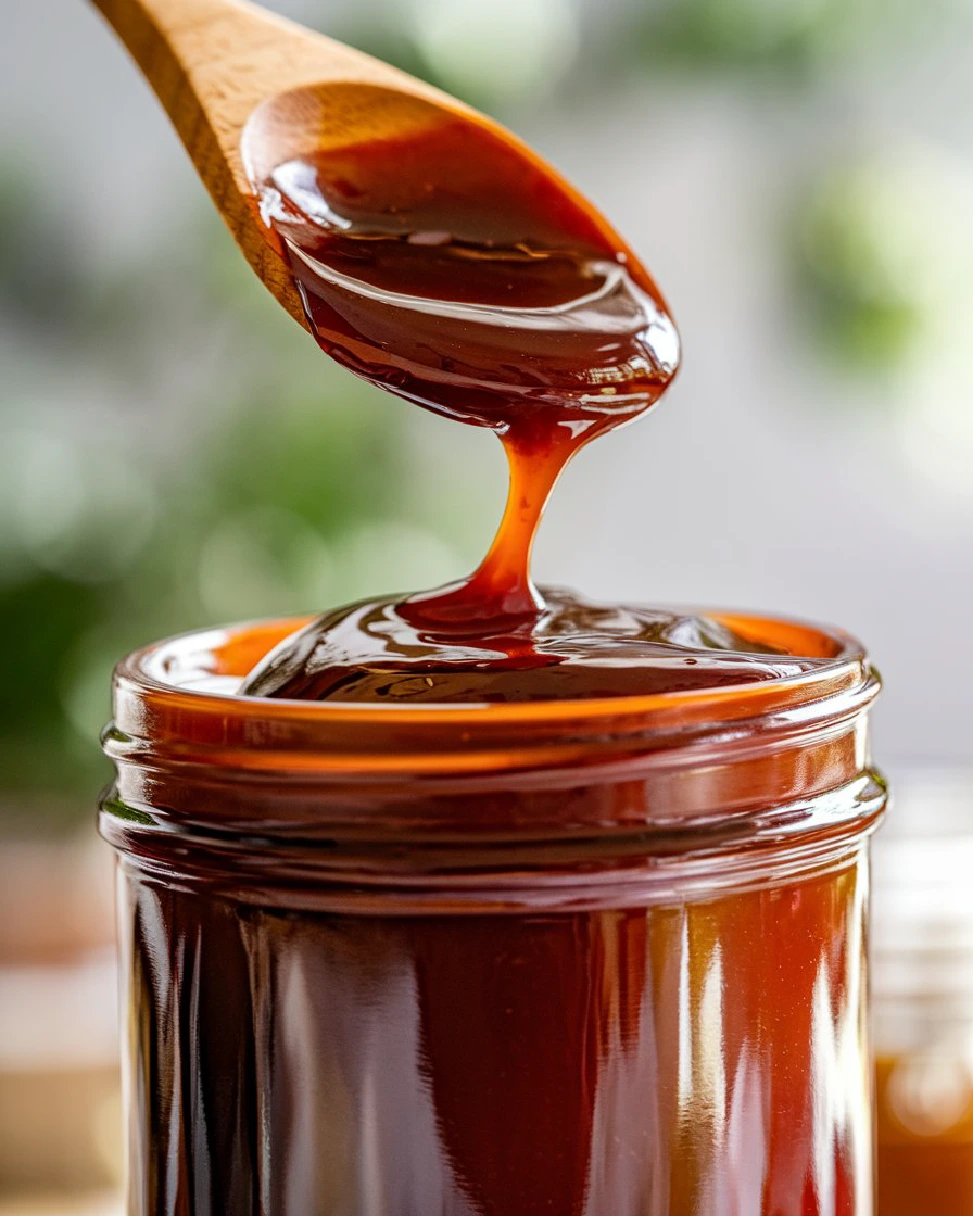
Variations: Customizing Your Homemade BBQ Sauce
One of the joys of making homemade BBQ sauce is customizing it to your taste. Here are some simple adjustments:
Sweet BBQ Sauce Recipe
For a sweeter sauce perfect for chicken and pork:
- Double the brown sugar
- Add 2 tablespoons honey
- Reduce vinegar to 2 tablespoons
- Add 1/4 teaspoon cinnamon for complexity
Spicy BBQ Sauce Recipe
For heat lovers:
- Increase cayenne to 1 teaspoon
- Add 1 tablespoon hot sauce
- Include 1/2 teaspoon crushed red pepper flakes
- Try 1 teaspoon of chipotle powder for smoky heat
Smoky BBQ Sauce
For authentic smoke pit flavor:
- Double the smoked paprika
- Add 1 teaspoon liquid smoke
- Include 1/2 teaspoon cumin
- Try using fire-roasted tomatoes if making from scratch
Bourbon BBQ Sauce
For sophisticated adult flavor:
- Add 3 tablespoons bourbon (alcohol cooks off)
- Increase brown sugar slightly
- Add a pinch of cloves
- 1 teaspoon orange zest for brightness
BBQ Sauce Pairings
Different styles of homemade BBQ sauce complement specific meats:
BBQ Sauce Style and Best Pairings
Kansas City
Pairs well with: Ribs, Chicken, Burnt Ends
Why it works: The sweet thickness sticks well to these meats.
Texas
Pairs well with: Beef Brisket, Beef Ribs
Why it works: The thinner texture soaks into the meat. The spice profile goes well with beef.
Carolina
Pairs well with: Pulled Pork, Pork Shoulder
Why it works: The vinegar cuts through the fatty pork nicely.
Memphis
Pairs well with: Dry-Rubbed Ribs (as a finisher)
Why it works: The balanced flavor enhances the dish without being too strong.
Alabama White
Pairs well with: Chicken, Turkey, Pork
Why it works: The creamy texture and tang go well with lighter meats.
For sides, consider sauce match:
- Sweet sauces pair with creamy coleslaws and cornbread
- Spicy sauces balance well with potato salad and baked beans
- Vinegar-forward sauces complement mac and cheese
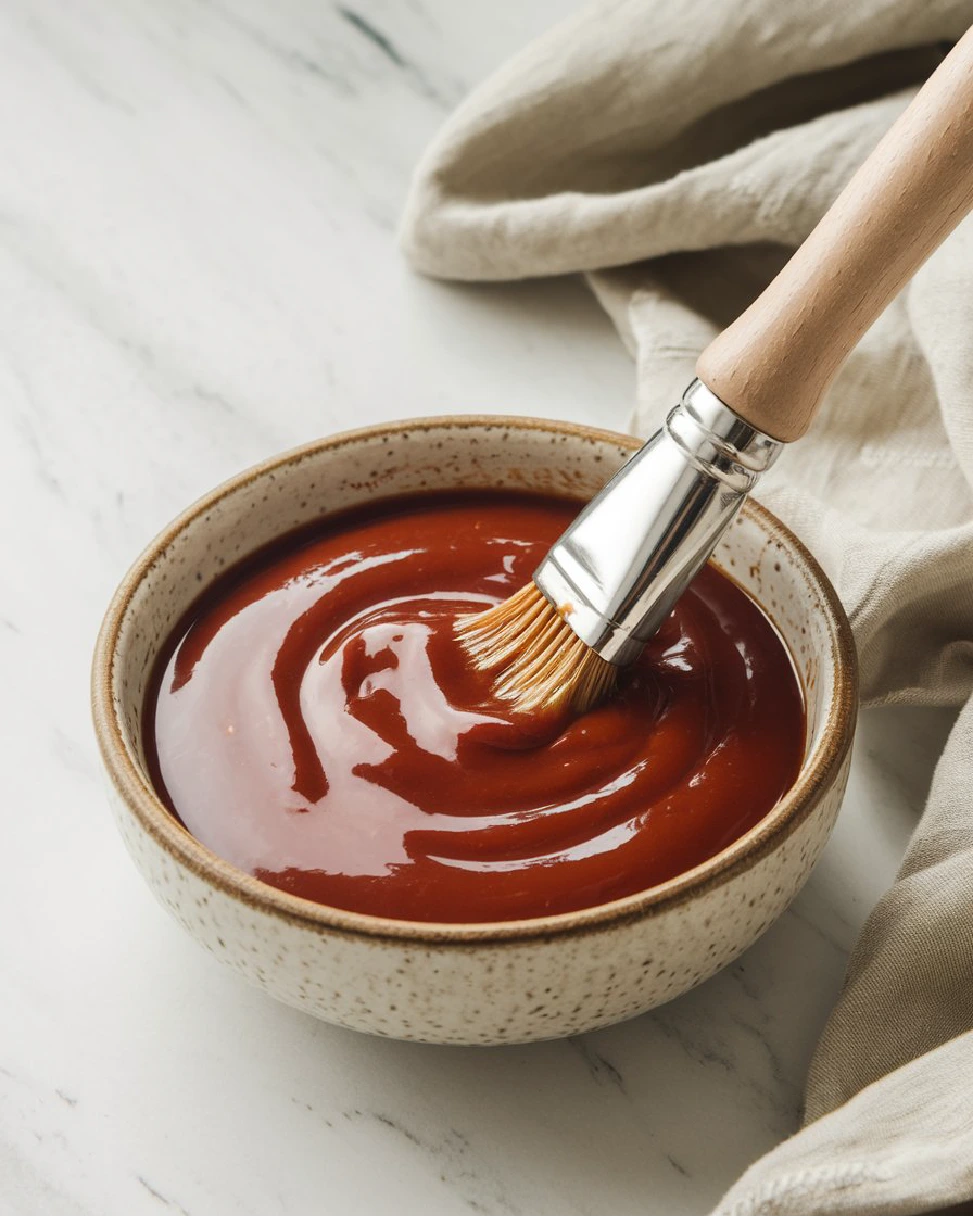
Troubleshooting Your Homemade BBQ Sauce
Even experienced cooks encounter issues with homemade BBQ sauce. Here are solutions to common problems:
Overly Sweet
- Add more vinegar, 1 teaspoon at a time
- Incorporate more dry mustard for balance
- A pinch of salt can counteract sweetness
Excessively Tangy or Acidic
- Add more sweetener
- A pinch of baking soda can neutralize excess acidity
- More tomato base can dilute vinegar punch
Too Thin
- Simmer longer to reduce and thicken
- Add 1 tablespoon tomato paste
- For emergency thickening, mix 1 teaspoon cornstarch with 1 tablespoon cold water and incorporate
Too Thick
- Add water, broth, or apple juice in small amounts
- A tablespoon of bourbon or whiskey adds thinning and flavor
Burnt or Scorched Taste
- Do NOT scrape the bottom of the pan
- Transfer to a new container, leaving burnt bits behind
- Add a touch of honey to mask slight scorching
Storage & Shelf Life
Proper storage ensures your homemade BBQ sauce stays fresh and flavorful:
- Refrigerate homemade BBQ sauce in airtight containers, and it will typically last 2-3 weeks.
- Freezing: For longer storage, freeze in ice cube trays or small containers for up to 3 months.
- Canning: For shelf-stable sauce, follow proper water bath canning procedures (requires sufficient acidity).
- Signs of spoilage: Discard if you notice off odors, mold, or bubbling.
Pro tip: Date your containers and consider making smaller batches more frequently for the freshest flavor.
FAQ
Yes! Use 6 oz tomato paste + 1/4 cup water + 2 tbsp additional vinegar and adjust sweeteners to taste.
Increase sweet elements or add a tablespoon of butter to mellow heat. You can also add more tomato base to dilute the spices.
The combination of acidity (pH below 4.6), sugar content, and proper canning techniques. For true shelf stability, water bath canning is necessary.
Absolutely! Use 2-3 cloves minced garlic instead of powder. Cook it briefly in a tablespoon of oil before adding other ingredients.
This is normal because of natural oils. Simply whisk before using or blend for a more emulsified texture.
Reduce sugar by using pureed fruits like apples or dates. Use low-sodium ketchup. Add more spices for flavor without extra sweetness.
Making homemade BBQ sauce is a fun cooking project. It lets you create the exact flavor you like. To make real Texas style BBQ sauce or a sweet sauce for chicken, this guide will help. You can create something much better than store-bought sauces.
What’s your favorite style of BBQ sauce? Share your experiences and questions in the comments below!
homemade BBQ Sauce
Ingredients
- 2 Cups Ketchup
- ¼ Cup Apple cider vinegar
- ¼ Cup Brown sugar Packed
- 2 Tablespoons Molasses
- 1 Tablespoon Worcestershire sauce
- 2 Teaspoons Smoked paprika
- 1 Teaspoon Garlic powder
- 1 Teaspoon Onion powder
- ½ Teaspoon Black pepper
- ½ Teaspoon Dry mustard
- ¼ Teaspoon Cayenne pepper (adjust to taste)
- ¼ Cup Water (to adjust consistency)
Instructions
- Combine all ingredients except water in a medium saucepan over medium heat.
- Bring to a gentle simmer, stirring frequently to prevent scorching.
- Reduce heat to low and simmer for 15-20 minutes, stirring occasionally.
- Add water as needed to reach desired consistency.
- Taste and adjust seasonings as needed.
- Allow to cool before transferring to bottles or jars.
